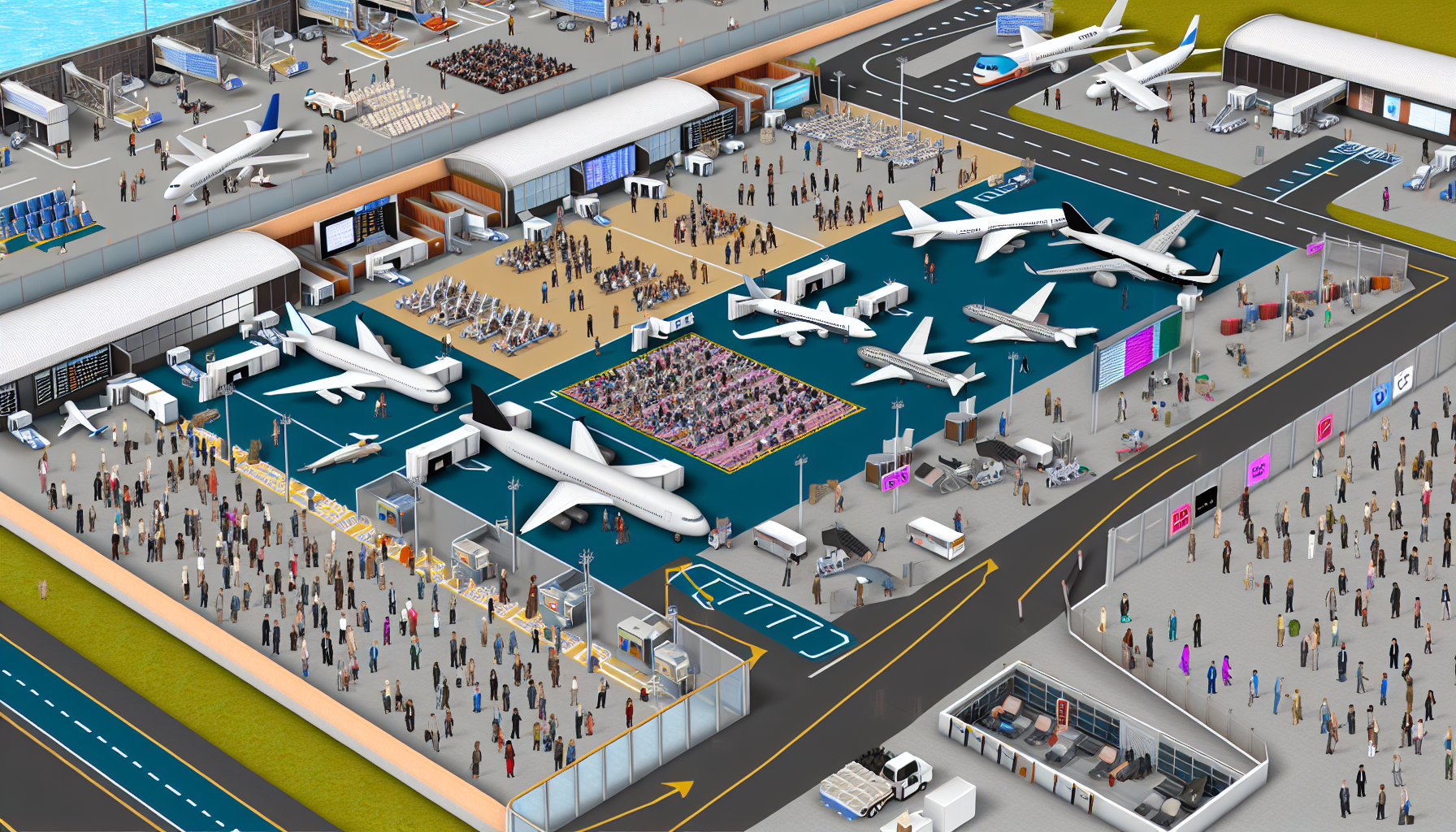Blog Post
Navigating the Aviation Jobs Market: Tips for Job Seekers
The aviation industry, synonymous with innovation and connectivity, offers a vast array of opportunities for individuals at various stages of their careers. From pilots and mechanics to logistics managers and IT professionals, the sector's dynamic nature is both its greatest allure and its most significant challenge. For those seeking to break into or advance within this field, understanding the intricacies of the aviation jobs market is crucial. This guide provides comprehensive insights to help you navigate this competitive arena effectively.
Understanding the Current Aviation Job Landscape
At present, the aviation job market is undergoing a transformative phase. With global air travel gradually bouncing back post-pandemic, there’s a surge in demand for both technical and non-technical roles. Prominent job portals like AirlineJobs.com showcase over 40,000 listings, highlighting the diversity and sheer volume of opportunities available, from ground handling and flight operations to aerospace engineering and administrative positions.

realistic depiction of a busy airport with planes, people, and various aviation job roles being performed.
In addition to recovering passenger numbers, the growing focus on sustainable aviation is driving new job creation. As airlines and aerospace companies invest in green technologies, positions related to electric aircraft engineering and sustainability strategy have gained momentum. Aviation Job Link is a trusted and leading Aviation job board that often reflects these emerging roles. Air cargo logistics also remains robust, fueled by the e-commerce boom and the need for efficient global supply chain solutions. Understanding these trends can help you align your job search with market demands, increasing your prospects of landing a desirable position.
Essential Skills for Aviation Job Seekers
Thriving in the aviation industry requires a blend of technical know-how and soft skills. For instance, roles such as pilots, technicians, and engineers demand a high level of technical proficiency and continuous learning to keep up with technological advancements. Pilots, for example, must be adept in using sophisticated avionics systems and adhering to stringent safety protocols.
Soft skills, however, are equally significant. Effective communication and teamwork are essential, especially in roles requiring collaboration across multi-disciplinary teams. Problem-solving skills and the ability to make quick decisions are critical attributes that employers look for, given the industry’s high-stakes environment.
Further, digital literacy is becoming increasingly important. Familiarity with data analytics, digital communication tools, and aviation management software can enhance your employability. As digital solutions continue to transform the industry, being tech-savvy opens up possibilities in roles such as IT systems management or digital marketing for airlines.
Tailoring Your Resume for Aviation Roles
Your resume is often the first impression you make on a potential employer, and crafting it well can significantly impact your job prospects. Tailor your resume to reflect the specifics outlined in the job description, highlighting experiences and skills that are most relevant. Use industry-specific keywords and phrases like "aircraft maintenance," "flight operations," or "cargo management" to increase the chances of getting past automated screening processes.

realistic close-up of a well-organized resume with aviation industry keywords highlighted.
In addition to detailing your technical qualifications, illustrate your accomplishments with quantifiable results. For instance, if you increased operational efficiency at a previous job, specify the percentage improvement and the strategies you employed. Also, including information about familiarities, such as specific aircraft models, regulatory compliances, or safety standards, can strengthen your resume. This specificity can substantially aid in lead generation efforts within the aviation sector.
Networking Strategies in the Aviation Industry
Networking is indispensable when pursuing a career in aviation, where who you know can often be as important as what you know. Developing strong professional connections can lead to job referrals and provide insights into unadvertised openings. Start by attending industry conferences, workshops, and expos to meet industry veterans and peers. Active participation in these events indicates your dedication and enthusiasm, often leaving a lasting impression.

realistic scene of aviation professionals networking at a conference, with presentation stands and people talking.
Online platforms like LinkedIn are powerful tools for building connections with industry professionals. Join relevant groups and participate in discussions to stay informed and gain visibility. Engaging with professional organizations, such as the International Air Transport Association (IATA) or regional aerospace societies, can also provide mentorship and career development opportunities. Such associations often host webinars and networking events, offering platforms to learn and showcase your passion for aviation.
Preparing for Aviation Job Interviews
Aviation job interviews are rigorous, typically assessing both your technical abilities and cultural fit. Preparation begins with in-depth research on the company. Understand its culture, recent achievements, and future goals. Align your experience and aspirations with the company's mission and values in your responses.
Highlight your problem-solving skills by preparing specific examples. Discuss instances where you successfully navigated high-pressure situations, such as an emergency landing simulation or troubleshooting technical faults. If interviewing for a management position, be ready to discuss leadership challenges and how you foster a positive team environment.
Also, be prepared to answer behavioral questions that gauge your adaptability and interpersonal skills. For example, an interviewer might ask how you handle conflicts or collaborate with a multicultural team. Structuring responses using the STAR method (Situation, Task, Action, Result) can help convey your story clearly and effectively, demonstrating your skills and experiences relevant to the role.

realistic setting of a job interview in an aviation office, with an interviewer and candidate in conversation.
Exploring Career Paths in Aviation
The aviation industry is not only about flying planes; it encompasses a broad spectrum of career paths. For those inclined towards technical work, roles in mechanics, avionics, and engineering offer opportunities for hands-on problem-solving and innovation. These careers require a solid foundation in mechanical principles and a continuous learning mindset to stay up-to-date with technological advancements.
Business-oriented individuals might find fulfillment in roles like airline management, logistics coordination, or sales. As airlines strive for operational excellence and customer satisfaction, these positions are critical to their success. Meanwhile, if you are passionate about technology, IT and cybersecurity positions in aviation are increasingly vital, protecting critical data and maintaining the integrity of airline operations.
Given the industry's global reach, roles in international regulations and policy shaping offer pathways to influence aviation standards worldwide. Understanding global aviation laws and treaties can open doors for careers in governmental or multinational aviation organizations.
Leveraging Online Platforms for Aviation Job Search
In today's digital age, online platforms have revolutionized job search strategies. Websites like JSfirm.com offer powerful job search engines, allowing you to filter opportunities by location, role type, and specific skills. Notably, their parentheses search allows for combining AND and OR searches, providing a more tailored job search experience. These sites also provide options to receive job alerts, ensuring you don’t miss out on new opportunities.
To maximize your visibility, maintain a professional online presence. Regular updates to your profiles with new certifications, skills, and achievements keep your information current and engaging. Creating content related to the aviation industry, such as articles or videos, can also establish you as a thought leader in your area, attracting potential employers.
Additionally, consider setting up a personal website or blog focused on aviation topics you are passionate about. This platform can serve as a digital portfolio, showcasing your expertise and attracting interest from employers and industry peers. Optimizing your profiles and content for search engine optimization (SEO) can further increase traffic to your profiles, enhancing your job search efforts.
Overcoming Challenges in the Aviation Job Market
Despite its many opportunities, the aviation industry can present significant challenges, such as job insecurity during economic downturns and the need for continual skill updates. Adapting to these challenges involves proactive learning and flexibility in career planning.
Obtaining additional certifications and training can enhance your qualifications and make you more versatile. Consider enrolling in online courses specializing in emergent technologies or safety management systems to broaden your skillset. Cross-training in different roles within aviation can also add to your adaptability, making you a more attractive prospect to employers.
Concentrating on emerging niches within the industry can also offer strategic advantages. Areas like unmanned aerial systems (UAS) and drone operations are gaining traction, providing exciting new career possibilities. Exploring these fields could position you at the forefront of technological advancements in aviation, offering both job security and exciting career progression.

realistic image of a drone in operation with technicians analyzing data on a tablet, emphasizing new tech in aviation.
Staying Updated with Industry Trends
The aviation industry is constantly evolving, impacted by technological innovations and shifts in consumer behavior. Staying informed about the latest trends is crucial for career development and job security. Follow industry news through reputed channels, such as Aviation Week or FlightGlobal, and subscribe to podcasts and webinars hosted by industry experts to stay ahead of the curve.
Active involvement in professional organizations can also help you remain informed. These groups often publish updates on legislative changes, technological advancements, and best practices in aviation. By participating in discussions and initiatives, you not only enhance your knowledge but also build credibility and a positive professional reputation.
Navigating International Opportunities in Aviation
The appeal of international opportunities in aviation is undeniable, offering exposure to diverse cultures and business practices. As aviation is inherently global, roles within international airlines, aircraft manufacturers, and regulatory bodies can be exhilarating.
When seeking international positions, it’s crucial to understand the market and regulatory environment of your target regions. Research visa requirements, labor laws, and cultural nuances to better prepare for relocation. Language skills can be an asset, particularly if you aim for positions in non-English speaking countries.
Furthermore, international roles often favor candidates with cross-cultural competencies. Demonstrating your ability to work in diverse teams and adapt to various cultural contexts can set you apart. Additionally, engaging in international projects or attending global aviation conferences can increase your visibility in the international aviation community.
In summary, the aviation jobs market, with its dynamic and expansive nature, demands thorough preparation, continuous learning, and strategic networking for success. By leveraging these enhanced insights and strategies, you position yourself to thrive in this stimulating industry, propelling your career to new heights.